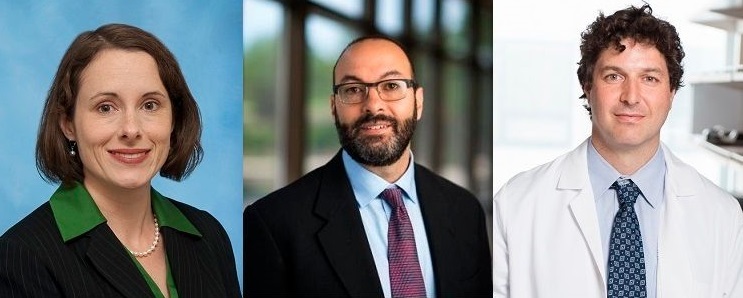Three young physician-scientists at U-M are kicking off 2019 with a welcome boost in funding for their research projects, through the Taubman Institute’s innovative grants program for medical school faculty.
Generous donors have provided three new Taubman Emerging Scholar grants, which will accelerate the research of early-career physician-investigators at the University of Michigan.
The program, which aims to help promising doctors further a research career while continuing to care for patients, was a favorite of the institute’s late founder, A. Alfred Taubman. Since the inception in 2011, the program has supported 30 investigators.
The Emerging Scholars paradigm connects philanthropists with faculty doing work in the donor’s area of interest – perhaps a disease that engages his or her curiosity, or one that affects family members. The parties often interact via lab tours, lunches and correspondence.
Donors have the satisfaction of knowing their contributions go directly to a specific project, while the scholars benefit through both financial and moral support at a critical point in their careers. Progress funded by Emerging Scholar grants lays the groundwork for external funding by the National Institutes of Health (NIH) or foundations.
William Parfet, a longtime benefactor of the university, is sponsoring his second Emerging Scholar.
“Al Taubman was the consummate visionary,” said Mr. Parfet. “He believed that if bright, energetic physicians who work in a robust academic environment are provided additional resources, novel discoveries can be made faster and less expensively that by more tradition means. I sponsor Emerging Scholars to support Al’s notion and to be an observer in this life-altering process.”
Karin Hardiman, MD, was selected to receive Mr. Parfet’s latest grant. Dr. Hardiman is a surgeon who studies colorectal cancer at the genetic level, seeking to better understand disease biology and new therapeutics.
“I am thrilled to be the new William Parfet Emerging Scholar,” she said. “This grant will move projects in my lab forward more quickly. I will be investigating predictors of treatment response in rectal cancer, and am preparing for NIH submission.”
Two other new scholars bring to 11 the number sponsored by Frances and Kenneth Eisenberg, who helped pioneer the Emerging Scholars Program. Both of the new recipients are physicians who focus their research in the mental health arena.
Jonathan Morrow, MD, PhD, performs research directly inspired by his clinical experience as an addiction psychiatrist. In particular, he is interested in why addiction often accompanies depression, post-traumatic stress disorder and other psychiatric disorders. His research looks at brain cell activity and aims to develop treatments that can address such clusters of disorders simultaneously.
Brendon Watson, MD, PhD, studies major depression, in particular how antidepressants help to heal normal brain functioning. By combining state-of-the-art human studies with powerful tools studying rodent subjects, he plans to optimize treatments for patients with depressive syndromes.
“The Emerging Scholar grant will allow my laboratory to use powerful neuroscientific tools to better understand the biology of major depression in rodent models and in patients,” said Dr. Watson.
In addition to the financial support, Emerging Scholars gain from the mentoring by senior faculty in the Taubman Scholar community, by rigorous review of their scientific approaches during monthly scholar “chalk talk” discussions and through collaborations made possible by the Taubman Scholar network of faculty.
“This is how we keep the pipeline full and ensure the next generation of medical breakthroughs,” said Charles F. Burant, MD, PhD, director of the Taubman Institute. “These talented researchers will find new treatments and cures not just for us, but for our children and their children. I can’t stress how important it is and how grateful we are to the forward-thinking philanthropists who partner with us.”
The Emerging Scholars grants generally are $200,000 over five years. For more information about how to sponsor an Emerging Scholar, contact Allyson Vernier at 734.763.7080






